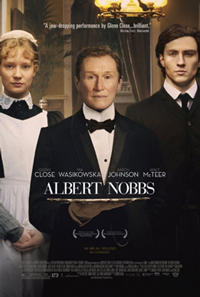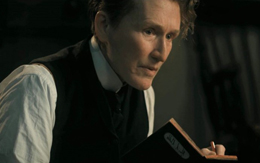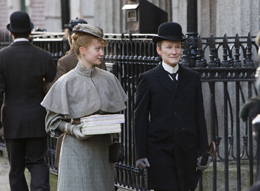 Albert Nobbs began as a passion project for actress Glenn Close. She participated in the stage production early in her career and has been trying to bring the stage play to the screen ever since.
Albert Nobbs began as a passion project for actress Glenn Close. She participated in the stage production early in her career and has been trying to bring the stage play to the screen ever since.
The motion picture version has all of the markers of a production championed by a single actor. Close is the sun around which the Albert Nobbs solar system rotates. In the same way that The Apostle relied on Robert Duvall or Pollock needed Ed Harris, Albert Nobbs was consistently overlooked or left unfunded for years and it took the tireless struggle of Close to finally bring it to the screen.
The film itself focuses on Albert (Glenn Close), a middle-aged woman living in 1910 Ireland who has been impersonating a man for many decades. Albert assumes the identity of a man in order to secure a job and an awkward independence, but becomes trapped by the role, and the anxiety of being discovered.
 When Mr. Hubert Page (Janet McTeer), a house painter, arrives and needs to stay in Albert’s room while the job is completed, Albert is soon discovered. Luckily Mr. Page is in a similar situation to Albert, and the two women soon form a strong bond.
When Mr. Hubert Page (Janet McTeer), a house painter, arrives and needs to stay in Albert’s room while the job is completed, Albert is soon discovered. Luckily Mr. Page is in a similar situation to Albert, and the two women soon form a strong bond.
A subplot involving two servants, Helen (Mia Wasikowska) a housemaid, and Joe (Aaron Johnson), a handyman, continues the threat to Albert’s secret.
Close and McTeer are compelling in their roles as Albert and Mr. Page. I am always concerned with any complex script that the story will become a delicate sugar sculpture, transparent and unsustainably fragile. At some point the gimmick or trick will become so apparent that it’s no longer possible to maintain our suspended disbelief, but both Page’s and Albert’s stories are simple and compelling and McTeer and Close play them with a mixture of sympathy and stoicism that draws even a reluctant viewer in.
 As we watch this film, we are forced to weigh the price paid by these two women for their adopted personas. Does the security and authority that comes with the perception of masculinity outweigh the dangers of being discovered? Is this transgender identity inherent to either character, or was it only born of pragmatic necessity? What of the stifled sexuality of Albert? So consumed with saving his money and hiding his gender, Albert has become isolated completely.
As we watch this film, we are forced to weigh the price paid by these two women for their adopted personas. Does the security and authority that comes with the perception of masculinity outweigh the dangers of being discovered? Is this transgender identity inherent to either character, or was it only born of pragmatic necessity? What of the stifled sexuality of Albert? So consumed with saving his money and hiding his gender, Albert has become isolated completely.
This film allows each of these questions to float in the near background without ever bringing any of them forcefully to the front. This allows the viewer to wrestle which each in turn, without the burden of being argued to or lectured at.
The questions are never simplified and one of ways the film avoids drifting into stereotype or caricature is by maintaining a stoic and dour tone. This is a grey film that is slowly paced and stoically performed. Some might find Albert Nobbs tiresome or boring, but it’s tone is necessary. This world is devoid of black or white solutions, and the pressures that destroy us do so slowly and methodically.
 Albert Nobbs weakness comes in it’s supporting cast. Mia Wasikowska and Aaron Johnson seem silly and oversimplified as the “normal” couple, bound by their society, sexual drives and biological consequences. The conflict that arises between Albert, Joe and Helen is apparent, but Wasikowska, who turned in solid performances in both Jane Eyre and Restless earlier this year, feels underwhelming as Helen. Johnson as Joe is rarely interesting.
Albert Nobbs weakness comes in it’s supporting cast. Mia Wasikowska and Aaron Johnson seem silly and oversimplified as the “normal” couple, bound by their society, sexual drives and biological consequences. The conflict that arises between Albert, Joe and Helen is apparent, but Wasikowska, who turned in solid performances in both Jane Eyre and Restless earlier this year, feels underwhelming as Helen. Johnson as Joe is rarely interesting.
In spite of its problems and the fact that Close is so obviously the fulcrum, around which this film pivots, Albert Nobbs poses some exciting and imponderable questions that will rattle in your brain without clear answers, and the performances that McTeer and Close offer are well worth seeing.







Comments on this entry are closed.